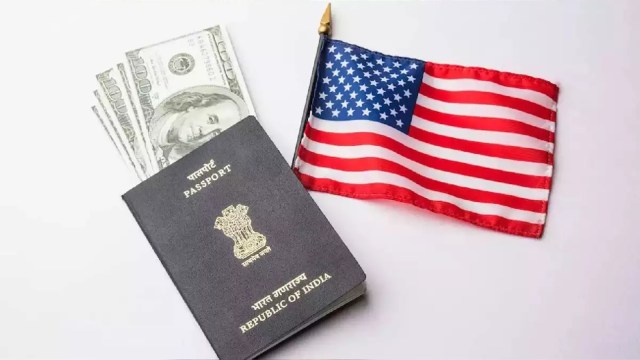OPT Fair Tax proposes no financial relief for foreign students working in the US: What it means for those under F-1 visa
If the OPT Fair Tax Act becomes law, Indian students could see a direct impact on their post-study earnings and living budgets.
 The F-1 visa is a non-immigrant category for students attending academic institutions in the US, while the M-1 visa covers vocational and non-academic programmes.
The F-1 visa is a non-immigrant category for students attending academic institutions in the US, while the M-1 visa covers vocational and non-academic programmes.The US Senate is considering a proposal that could significantly change how international students on work authorisation are taxed. The OPT Fair Tax Act (S. 2940), introduced by Senator Tom Cotton in September 2025, seeks to remove payroll tax exemptions for students employed under the Optional Practical Training (OPT) programme. The Bill has been referred to the Senate Committee on Finance for review.
If passed, it could increase payroll tax liability for both students and their employers — potentially affecting the cost of hiring and take-home pay for thousands of graduates working in the United States.
What the proposed law seeks to change
Under current federal law, foreign students on F-1 visas who work through the OPT programme are exempt from paying payroll taxes that fund Social Security and Medicare, collectively known as the Federal Insurance Contributions Act (FICA) taxes. The new Bill proposes to end this exemption.
An extract of the S. 2940 bill, dubbed as the ‘OPT Fair Tax Act’ reads, “this paragraph (on exemption of taxes) shall not apply to service performed by an alien present in the United States as a nonimmigrant described in section 101(a)(15)(F)(i) of the Immigration and Nationality Act (8 U.S.C. 1101(a)(15)(F)(i)) who is participating in optional practical training.”
 Amendments as listed on the bill on OPT Fair Tax Act (Screengrab from congress.gov)
Amendments as listed on the bill on OPT Fair Tax Act (Screengrab from congress.gov)
In simpler terms, section 101(a)(15)(F)(i) of the Immigration and Nationality Act refers to F-1 non-immigrant student visa holders, while the paragraph on exemption relates to Social Security and Medicare tax exclusions under the Internal Revenue Code. The inclusion of this line effectively removes those exemptions for students working under OPT, making their income subject to standard payroll tax deductions.
The OPT Fair Tax Act would amend the Internal Revenue Code and the Social Security Act to classify OPT employment as taxable under FICA. If enacted, it would bring international student earnings under the same payroll tax obligations as US citizens and permanent residents. The law would take effect for wages earned in months following its enactment.
Understanding the current FICA exemption
At present, F-1 visa holders working under OPT are treated as non-resident aliens for tax purposes, as per the US Internal Revenue Service (IRS). The IRS rules specify that non-resident students in F-1 status, generally for their first five calendar years in the US, are not subject to Social Security or Medicare taxes on wages earned through authorised employment such as OPT.
The FICA tax rate is 15.3 per cent of wages, shared equally between employer and employee, 7.65 per cent each. This includes 6.2 per cent for Social Security and 1.45 per cent for Medicare.
For example, a student earning $50,000 annually saves about $3,825 in FICA taxes, while the employer saves an equal amount.
READ | Indian students in US grapple with changing visa rules
According to the Internal Revenue Service (IRS), the payroll tax rate under the Federal Insurance Contributions Act (FICA) is 7.65% of gross wages — made up of 6.2% for Social Security and 1.45% for Medicare. Based on this rate:
–A salary of $40,000 would have about $3,060 deducted,
–$60,000 would see around $4,590, and
–$80,000 around $6,120 in FICA contributions.
This exemption has long made the OPT programme financially attractive for international graduates and cost-efficient for employers.
What would change if the law passes?
If the proposed amendment takes effect, both students and employers would need to pay their respective FICA shares. Meaning, on a $40,000 annual salary, the FICA deduction for the student would be around $3,060, and so on, as shown above.
Employers would match these amounts, effectively increasing the total cost of employing one OPT worker by around 15.3 per cent. For example, hiring a graduate at $50,000 would now cost roughly $7,650 more in total payroll tax contributions.
This could make hiring international graduates more expensive for US companies and lower take-home pay for students, a change that might influence employment decisions, compensation structures, or even the perceived affordability of working in the US after graduation.
What is Optional Practical Training (OPT)?
OPT is a temporary employment authorisation granted by the US Citizenship and Immigration Services (USCIS) to international students holding F-1 visas.
It allows them to work in jobs directly related to their academic field for up to 12 months after completing their degree.
Students in certain STEM fields (science, technology, engineering and mathematics) can extend this authorisation for an additional 24 months under the STEM OPT extension.
The programme serves as a key transition phase for many foreign graduates, especially from India, who often use OPT experience as a bridge to longer-term work visas like the H-1B.
READ MORE | Beyond the H-1B Visa: Alternative pathways for students to build a career in US
Possible implications for Indian students
India is among the largest sources of OPT participants in the United States, according to data from the US Department of Homeland Security (SEVIS) and the Institute of International Education (IIE).
For many, the ability to work tax-free on payroll during OPT has made it financially easier to gain US work experience before moving to more competitive visa categories.
Supporters of the Bill argue that the current tax exemption gives foreign graduates an unfair advantage in the job market, since employers save on payroll taxes when hiring OPT workers compared to US citizens
If the OPT Fair Tax Act becomes law, Indian students could see a direct impact on their post-study earnings and living budgets.
The reduced take-home pay, coupled with higher living expenses in major US cities, may push some to reconsider their financial planning or explore alternative countries for post-study work opportunities.



- 01
- 02
- 03
- 04
- 05




























